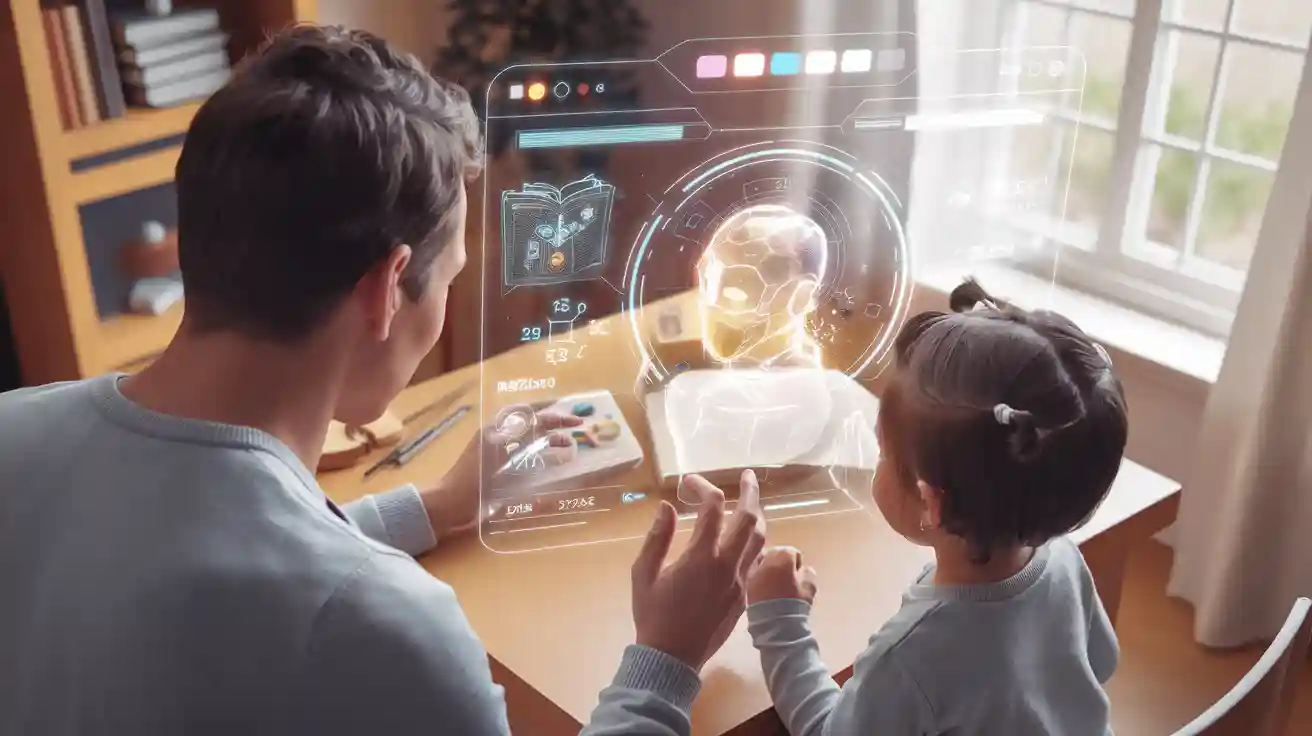Understanding AI Tutors A Parent's Guide to the Future of Learning

Imagine a tutor who knows your child’s strengths and weaknesses. It adjusts to their speed and helps them anytime. AI tutors make this happen. These smart systems use artificial intelligence to personalise learning for kids. They help children do better in school and learn more. Studies show AI tutors can work as well as human tutors. Learning improvements can reach nearly 0.85 on the effect size scale. Schools using AI tutors have fewer dropouts and more students finishing courses.
As a parent, you are important in your child’s education. AI gives you tools to check progress and find weak spots. It connects old teaching ways with new technology. This ensures your child is ready for future learning.
Key Takeaways
AI tutors change lessons to match your child's needs. This helps them learn better at their own speed.
Using AI tools can improve your child's grades by 30%. It also makes learning 45% more fun and exciting.
Parents are important in helping their child learn. They can use AI tools to track progress and assist at home.
It's important to balance screen time with other activities. Make sure to include breaks and family time with AI learning.
AI tutors work well with regular teaching. They make learning better and prepare kids for future challenges.
How AI Tutors Create Personalised Learning Plans
Tailoring lessons to individual needs
AI tutors are great at making study plans just for your child. They look at how your child performs, find strengths and weaknesses, and change lessons to fit. For instance, if fractions in Maths are hard for your child, the AI focuses on that. It gives special exercises and clear explanations to help. This way, learning gaps are filled, and progress is steady.
These plans also match your child’s speed and learning style. If they learn fast or need more time, the AI adjusts. This helps build confidence and lowers frustration, making learning fun. By focusing on what each child needs, AI tutors help them take charge of their learning and do their best.
Take Emma, a high schooler who found maths tough. Her school used AI tools to create a learning path just for her. She worked at her own speed and improved her maths scores by 40% in one term. This shows how powerful personalised learning can be.
Examples of AI tools that personalise education
Many AI tools have changed how learning is personalised. These tools use smart systems to study student data and create custom lessons. Here are some examples:
Mainstay: A chatbot that chats with students and gives support to help them do better in school.
Course Hero: An assistant that answers questions about courses and gives tips to help students understand better.
Performance prediction tools: These tools track how students are doing and help teachers step in when needed.
AI Tool | What It Does |
|---|---|
Personalised learning systems | Use smart systems to study student data and make custom lessons. |
AI chatbots | Answer student questions and give personal help. |
Performance prediction tools | Watch student progress and help teachers act quickly when needed. |
These tools show how AI makes learning personal, fun, and effective. Suited Tutor uses these advanced tools in its top tutoring services, giving your child the best help possible.
Benefits of personalised learning for children
Personalised learning plans bring many benefits to your child’s studies. Research says tailoring lessons improves performance by 30%, engagement by 45%, and retention by 30%. These numbers show how well AI-driven learning works.
Improvement Type | Percentage Improvement |
|---|---|
Student Performance | 30% |
Student Engagement | 45% |
Retention Rates | 30% |
Learning Outcomes | 24% |
Personalised learning keeps kids interested by matching lessons to their skills and likes. It helps them do better in school and learn problem-solving and thinking skills. It also lowers stress and makes learning enjoyable.
Suited Tutor’s courses, made by expert teachers, mix AI tools with great teaching. This gives your child a full learning experience to prepare them for what’s ahead.
Adapting AI Tutors to Different Ages and Learning Styles
Helping younger kids and older students
AI tutors change to fit the needs of all ages. Younger kids need more patience and fun activities. AI uses games and exciting tasks to make learning fun. Older students need clear plans and advanced tools. AI gives them detailed feedback and helps with tough subjects.
Younger Children: Enjoy fun games and positive encouragement.
Older Students: Use custom plans and track their progress.
Focus Area | Key Points | Suggestions |
|---|---|---|
AI in education | Use carefully to avoid too much tech dependence | |
Teachers' role | Combines tech with basic skills | Teach self-control, problem-solving, and teamwork |
Matching different learning styles
AI tutors adjust to how each student learns best. Visual learners like pictures and charts. Auditory learners prefer listening and talking. Kinaesthetic learners enjoy hands-on tasks and simulations. AI studies how students learn and changes its methods to suit them.
AI tools match lessons to how students learn best.
Custom paths let students learn at their own speed.
Simulations and activities help kinaesthetic learners.
Real-life examples of adaptive AI tools
Adaptive AI tools are improving education in big ways. Knewton’s platform raised test scores by 62%. Jill Watson, an AI assistant, answers 97% of questions correctly. Maths Pathway at New Town High School boosted STEM scores by 22%. These tools show how AI helps students learn better.
Example | Results Achieved |
|---|---|
Knewton's adaptive learning platform | 62% rise in test scores |
Intelligent tutoring system by Pai et al. | 30% better grades, 20% less anxiety |
Jill Watson AI teaching assistant | 97% correct answers to 10,000 questions |
Ivy Tech Community College | 80% grade prediction accuracy, saving 3,000 students |
Maths Pathway platform at New Town High School | 22% higher STEM test scores |
These examples show how AI tools improve learning and prepare students for the future.
Monitoring Progress with AI Tutors
Tracking milestones and achievements
AI tutors are great at keeping track of progress. They show clear updates about your child’s learning journey. These systems record daily work and display results on easy-to-read dashboards. You and your child can see how well they are doing. For example, dashboards collect data to show trends, skill gaps, and how helpful lessons are. This helps the AI change lessons to fit your child’s needs.
Research proves AI tutors are good at tracking progress. Some tools measure growth using trusted methods like the Childhood Autism Rating Scale (CARS) and the Vineland Social Maturity Scale (VSMS). These tools give numbers to show learning milestones. This detailed tracking makes sure no skill is missed, helping your child do their best.
Source | Improvement | Description |
|---|---|---|
Pearson Survey | Teachers saw better student results with adaptive learning paths. | |
McKinsey Report | 20% | Engagement rose by 20%, and learning outcomes improved by 30%. |
Education Week Research Centre | 15%-20% | Data analytics boosted student achievement rates. |
National Student Clearinghouse | 25% | Graduation rates increased over the last ten years. |
DreamBox Learning | 57% | Maths skills improved for students using AI-based lessons. |
Insights for parents to guide their child’s learning
AI tutors give parents helpful tips to support their child’s learning. By studying progress data, these tools find strengths, weaknesses, and areas needing extra help. For example, if fractions are hard for your child, the AI points this out and suggests practice tasks. This quick feedback lets you step in and offer support right away.
AI tutors also create detailed reports that show progress in small steps. These reports explain how your child is doing in different subjects or skills. With this knowledge, you can work with teachers or tutors to make better learning plans. Suited Tutor’s AI tools work well with regular teaching methods, giving your child a balanced education that fits their needs.
Bridging AI tutors with traditional teaching methods
AI tutors work alongside regular teaching to improve learning. A study with 900 tutors and 1,800 students showed AI tools helped students master skills 4% faster. This shows how AI can make tutoring better, even for new tutors.
Another study from Harvard found students using AI tutors learned twice as much in less time compared to regular classrooms. This proves AI can speed up learning while keeping quality high. Suited Tutor combines AI insights with traditional teaching to give your child the best of both worlds.
Suited Tutor’s services mix advanced AI tools with expert teaching. This approach gets your child ready for the future, giving them the skills to succeed in school and beyond.
Addressing Concerns About Screen Time and AI
Mixing online learning with offline activities
It’s important to balance screen time with other activities. AI tools make learning fun, but too much screen use can harm health and social skills. During COVID-19, kids spending over three hours daily on screens rose from 9.16% to 19.20%. This shows why balance is needed.
Encourage offline activities like reading, puzzles, or outdoor play. These help creativity and social skills while supporting AI-based learning. Studies show combining online AI learning with offline teaching improves grades and interest in school.
Setting rules for screen time
Making screen time rules helps kids build good habits. Too much screen use can cause sleep issues, lower grades, and ADHD-like symptoms. Limits ensure kids rest well and focus better during lessons.
Plan a daily routine with breaks for exercise and family time. For example, younger kids can have two hours of screen time, while older ones can have three. This helps their brain grow and behaviour improve.
Using a balanced learning approach
A balanced learning method mixes AI tutoring with regular teaching. AI systems often beat traditional methods in tests, but human-led activities boost creativity and thinking skills. For example, AI can personalise lessons to make learning fair, while group tasks teach teamwork and problem-solving.
Evidence Description | Key Points |
|---|---|
Students do better in tests and enjoy learning more. | |
AI can make education fairer | Personalised lessons help fix access and equity problems. |
Combining AI with human instruction | Mixing methods improves creativity and critical thinking. |
Using both AI tools and offline activities helps kids learn important skills. This balanced way prepares them for future challenges in school and life.
Ethical Considerations and Parental Involvement
Keeping AI tools safe and ethical
Using AI in schools needs careful thought about safety. Parents must help keep learning spaces secure. Pick AI tools that focus on safety and explain their systems clearly. Make sure they protect your child’s personal information.
Set rules to keep student data private and safe.
Learn how AI tools work to ensure they are fair.
Train teachers to use AI responsibly and wisely.
Teach kids to use technology in a smart way. Talk about how AI works and its effects on learning. This helps them think critically and prepares them for a future with AI.
Learning about AI in education
Knowing more about AI helps parents make better choices. Join school meetings to learn how AI is used in classrooms. Speak up for fairness and clear rules when AI is applied.
Discover how AI makes learning fair and open to all.
Use resources to teach kids about AI and future jobs.
Push for fixing biases in AI to make it inclusive.
Staying informed lets you pick tools that build skills and follow ethical rules. Suited Tutor’s courses mix advanced AI with expert teaching for balanced learning.
Being involved in your child’s learning
Parents who take part in their child’s learning make a big difference. Studies show home support helps kids more than school-only efforts. For example, parents guiding tech use improve grades and social skills.
Study | Findings |
|---|---|
Duncan et al. (2007) | Early learning investments give better results than later ones. |
Blevins-Knabe and Austin (2016) | Parents help kids grow mentally and socially through involvement. |
Ma et al. (2016) | Home-based help improves learning more than school partnerships. |
Hofferth (2010) | Computer access boosts learning when parents guide its use. |
Korat and Or (2010) | E-books improve parent-child interactions during learning. |
Support your child by checking AI tutor reports and working with teachers. Suited Tutor’s tools give detailed updates to help parents stay involved.
Gazz Barbe, a parent, shared how he manages his daughter’s tech use. He uses parental controls to stop overuse of AI tools. He warns that too much freedom can lead to kids relying on AI without learning properly.
By staying engaged, you improve your child’s education and prepare them for a future shaped by technology.
AI tutors have changed how kids learn by making lessons personal. They adjust to each child’s needs, helping them learn faster and remember more. Research shows AI tools can boost test scores by 23% and cut learning time by 42%.
Use/Insight | Main Findings |
|---|---|
AI supports writing lessons | Gives personal feedback beyond what teachers can manage |
Tech use builds student independence | Ongoing feedback helps students learn better and faster |
AI aids language learning | Improves interest and motivation in learning English writing |
AI tutors don’t replace regular teaching. They work with it to fill gaps and make learning smoother. For instance, AI feedback helps kids focus on weak areas while keeping them interested.
Parents are key to guiding their child’s learning. By using AI tools, you can help your child succeed in a world where technology and education go together.
FAQ
What is an AI tutor?
An AI tutor is a smart computer program that teaches students. It changes lessons to fit how your child learns and their speed. It gives personal feedback and tracks progress to help them improve skills.
How can AI tutors benefit my child?
AI tutors make learning fun and tailored to your child. They give quick feedback, track progress, and show areas needing work. These tools help your child learn faster and remember more.
Are AI tutors safe for children?
Yes, trusted AI tools focus on safety. They keep personal data private and follow strict rules. Pick platforms that explain their privacy policies and protect your child’s information.
Can AI tutors replace human teachers?
AI tutors work with teachers, not instead of them. They handle simple tasks and create custom learning plans. Teachers focus on creativity, problem-solving, and emotional support for balanced learning.
How much screen time is recommended for children using AI tutors?
Experts say younger kids should have two hours of screen time daily. Older kids can have three hours. Include breaks and offline activities to keep learning healthy and balanced.
See Also
The Impact of AI on Tomorrow's Educational Landscape
Tailored Learning Approaches to Enhance Student Success
Overcoming Academic Hurdles: Insights for Students and Guardians

